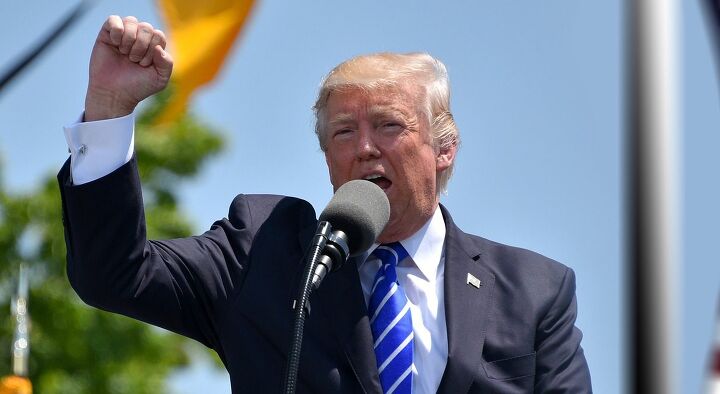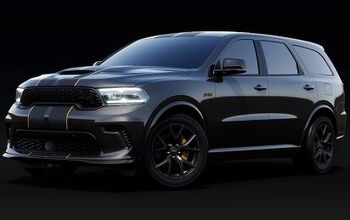Trade War Watch: Trump Launches National Security Investigation On Auto Imports

President Donald Trump issued a tweet promising car manufacturers good tidings on Wednesday. “There will be big news coming soon for our great American Autoworkers,” he said. “After many decades of losing your jobs to other countries, you have waited long enough!”
Later that same day, the administration announced it had launched a national security investigation into car and truck imports under Section 232 of the Trade Expansion Act of 1962. The Commerce Department explained that the probe would investigate whether imported vehicles and parts threaten the domestic industry’s wellbeing, taking into account its ability to develop new technologies and the impact of tariffs.
“There is evidence suggesting that, for decades, imports from abroad have eroded our domestic auto industry,” Commerce Secretary Wilbur Ross said.
While Ross assures a “thorough, fair and transparent investigation,” opposition to the probe has already begun to emerge. “China opposes the abuse of national security clauses, which will seriously damage multilateral trade systems and disrupt normal international trade order,” Gao Feng, spokesman for the Chinese Ministry of Commerce, said at a news briefing on Thursday.
China recently agreed to cut its tariffs on imported automobiles in a bid to open its market to foreign automakers. This occurred after the U.S. announced new import taxes on steel and aluminum. Meanwhile, America recently worked out a deal with South Korea that involved a tentative promise to open its own market a bit if the western nation agreed to give it a break on steel tariffs.
No such deal exists with Japan. Curious, since it’s one of the United States’ closest security allies and imposes no tariffs on vehicles.
According to Reuters, Germany’s DIHK Chambers of Industries and Commerce said Trump completely ignored the fact that German companies invest heavily in the U.S. and create manufacturing jobs there — a claim that could be similarly made for Japan and South Korea.
“To cite aspects of national security as justification is totally constructed and far-fetched. We almost have to take this as a provocation,” DIHK President Eric Schweitzer said. “I gain more and more the impression that the United States no longer believes in competition for ideas and customers, but only in the right of the supposedly stronger.”
“It fills me with great concern that the U.S. is moving away from a free and fair world trade order,” he added.
The Commerce Department’s claim that the probe is intended to determine if lost domestic production has affected the U.S. economy seems clear cut enough, but analyzing if automakers lost the ability to research advanced technologies is somewhat perplexing. While the United States isn’t the global leader in every category that qualifies as advanced tech, it’s the way in the field of autonomous driving and remains competitive just about everywhere else as far as development is concerned.
A Trump administration official said prior to the probe’s announcement that the expected strategy would be involve pressuring Canada and Mexico to make concessions on NAFTA. Considering how poorly and slowly those talks have progressed, threatening research that could result in higher import fees could be a way to convince them to play ball. The investigation could have a similar goal in regard to other countries that ship a lot of cars to the United States, too.
In a meeting with automakers earlier this month, Trump speculated that tariffs on imported automobiles and parts may be increased. Sources claimed the president said 20 percent or 25 percent on some vehicles, which would represent a massive increase. While trucks have been subject to U.S. import duties of 25 percent for decades, imported cars sit at a only 2.5 percent.
For the sake of comparison, Europe imposes a relatively flat 10 percent import tariff on vehicles. China has said it will reduce its 25 percent fee on automobiles to 15 percent starting this July. However, trucks are expected to stay at 20 percent.

A staunch consumer advocate tracking industry trends and regulation. Before joining TTAC, Matt spent a decade working for marketing and research firms based in NYC. Clients included several of the world’s largest automakers, global tire brands, and aftermarket part suppliers. Dissatisfied with the corporate world and resentful of having to wear suits everyday, he pivoted to writing about cars. Since then, that man has become an ardent supporter of the right-to-repair movement, been interviewed on the auto industry by national radio broadcasts, driven more rental cars than anyone ever should, participated in amateur rallying events, and received the requisite minimum training as sanctioned by the SCCA. Handy with a wrench, Matt grew up surrounded by Detroit auto workers and managed to get a pizza delivery job before he was legally eligible. He later found himself driving box trucks through Manhattan, guaranteeing future sympathy for actual truckers. He continues to conduct research pertaining to the automotive sector as an independent contractor and has since moved back to his native Michigan, closer to where the cars are born. A contrarian, Matt claims to prefer understeer — stating that front and all-wheel drive vehicles cater best to his driving style.
More by Matt Posky
Latest Car Reviews
Read moreLatest Product Reviews
Read moreRecent Comments
- ToolGuy I might be Batman.
- Lou_BC Well, I'd be impressed if this was in a ZR2. LOL
- Lou_BC This is my shocked face 😲 Hope formatting doesn't fook this up LOL
- Lou_BC Junior? Would that be a Beta Romeo?
- Lou_BC Gotta fix that formatting problem. What a pile of bullsh!t. Are longer posts costing TTAC money? FOOK


































Comments
Join the conversation
This should have happened 20 years ago. It no longer matters now. To simplify things just walk away from NAFTA.
Soviet Union was fully self-dependent. Everything was designed and made internally even computer chips and personal computers (which suck BTW and rarely worked). Soviet Union had unlimited resources - that's how it won the war with Germany. After WWII SU was very strong and consolidated country with unbeatable victorious army. Nevertheless SU collapsed in just 40 years after WWII. In contrast America was always divided country in permanent state of civil war cold or hot except of short period of national unity after WWII and 9/11. All Americans care about is mighty $ and happy to sell out everything and lay off all countrymen and send all jobs abroad. Half of Americans at any given moment hate political system, president and party in power. American companies has very short life cycle and grow and die fast - take "mighty" iconic Xerox for example which is in process to be taken over by Fujifilm. Eventually American companies die and have after life in China, Japan or Europe. Nevertheless America somehow not only survived but exported American way of life all over the world including Europe and Asia and totally dominates the world. Germany's and Japan's world domination did not materialize as well as Chinese will not. If some country or axis try to blackmail America or declare war on America America will simply eliminate that country one way or another. Only naive people may think US will never use WMD or overwhelming deadly sanctions or cyber warfare (where America dominates) or assassination using drones or satellites. As a matter of fact US used WMD against civilian population, as well as firebombing, regime change, assassinations of foreign leaders. Just ask Saddam who dared to threaten US and sitting president or Qaddafi who annoyed US. Or watch Kim who dares to challenge US with nuclear weapon (big mistake) to be gone in few years along with his ridiculous and failed regime. And same with Iranian regime which is on death throes already - no need to negotiate with them. So outsourcing less productive job does not threaten national security, but waking the sleeping tiger with overwhelming economic power does and we are not talking about US national security here. Regarding Trump I think it is just negotiation tactics.